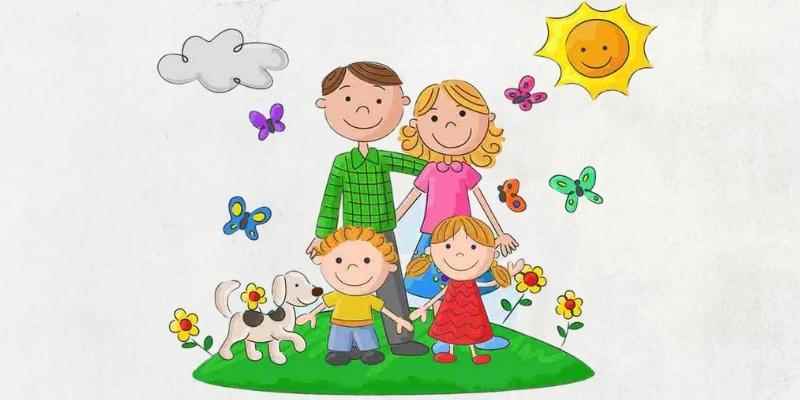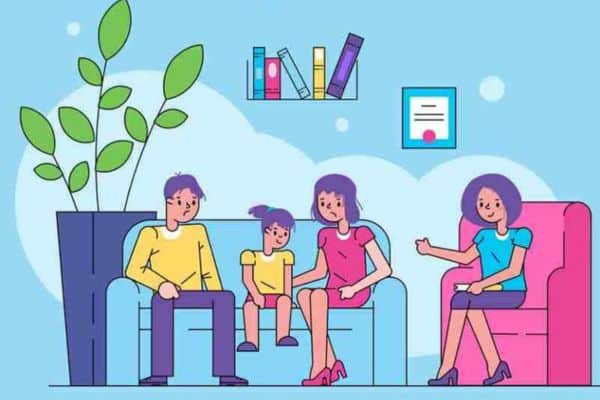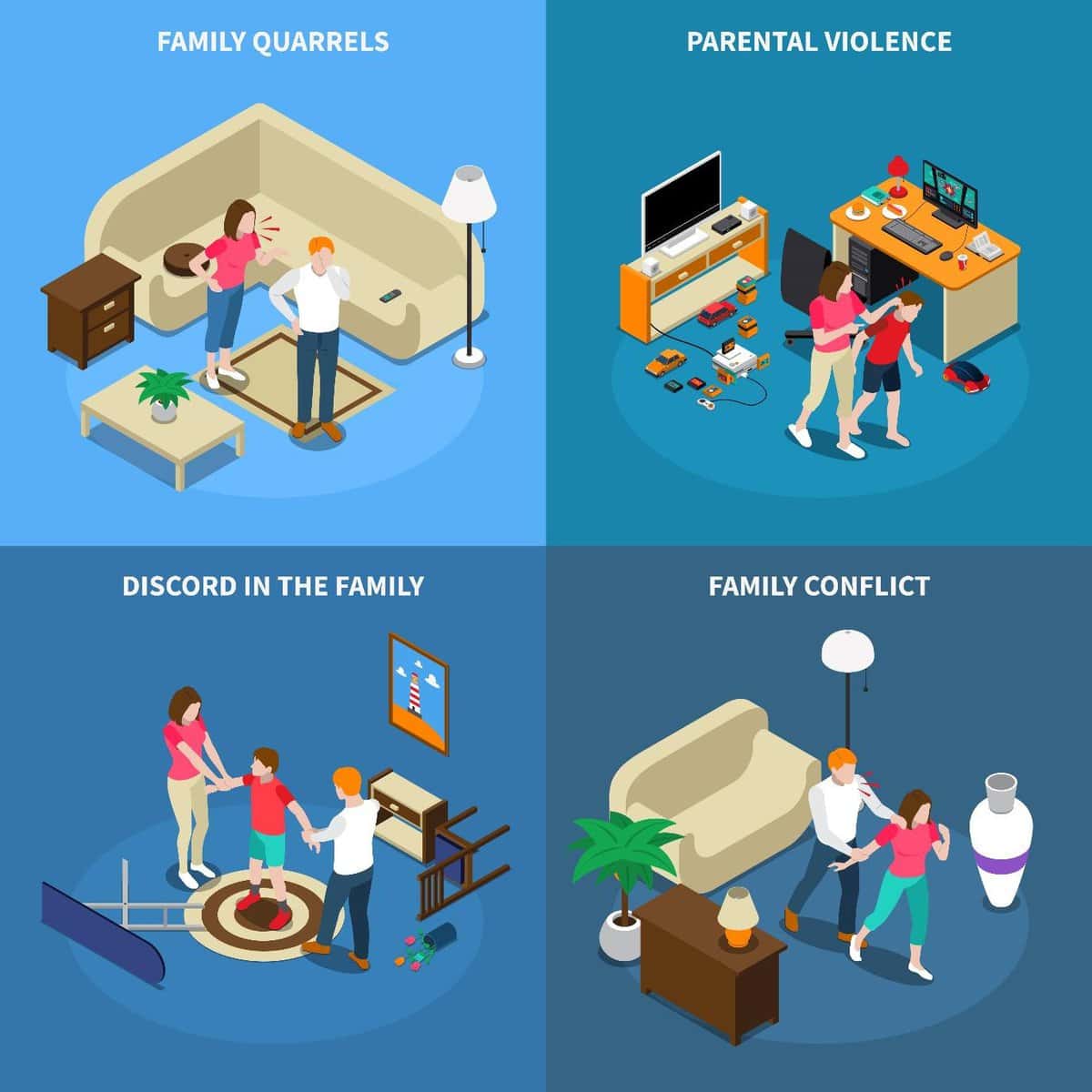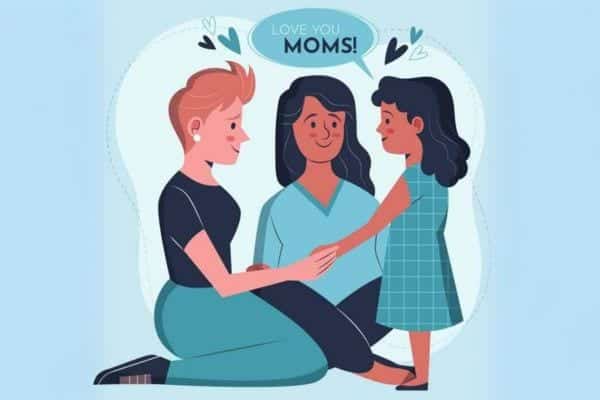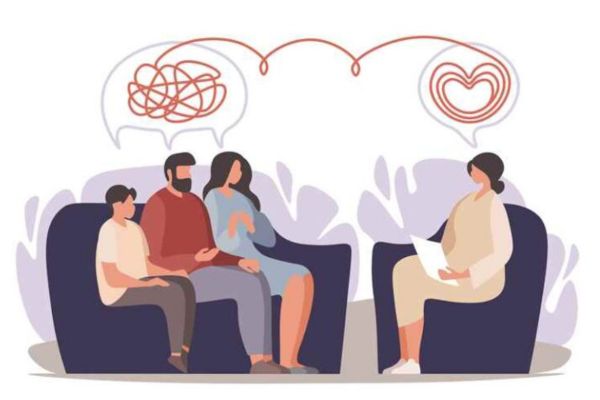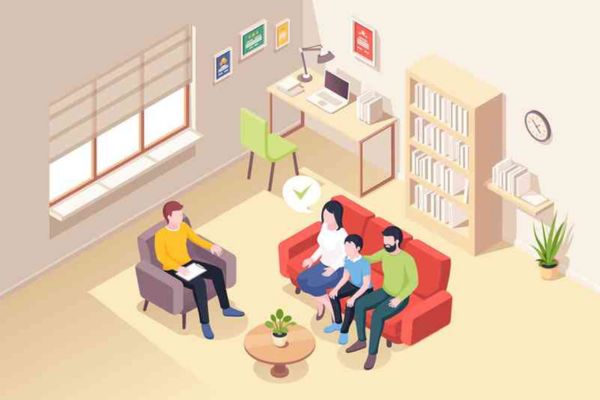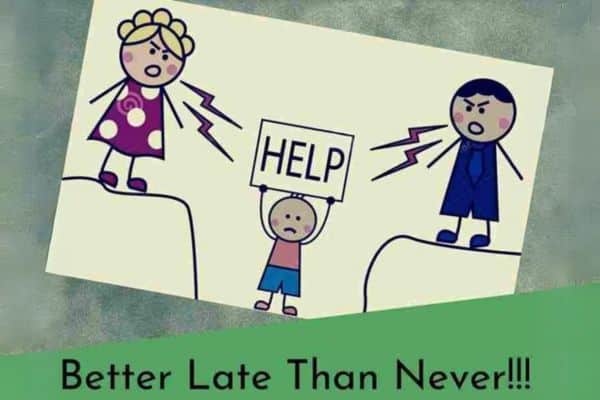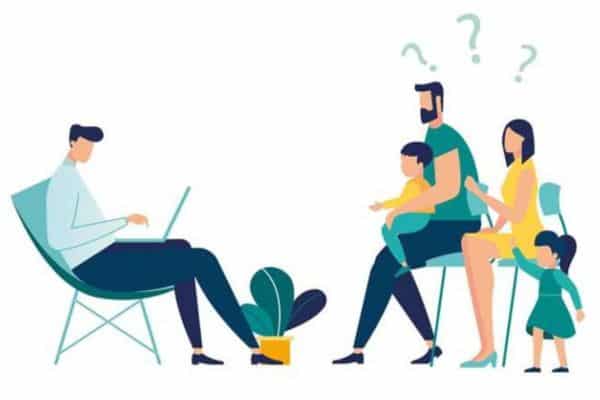“The power of family therapy derives from bringing men and women, parents and children together to transform their interactions” – Nichols & Schwartz
How Do We Define A Family?
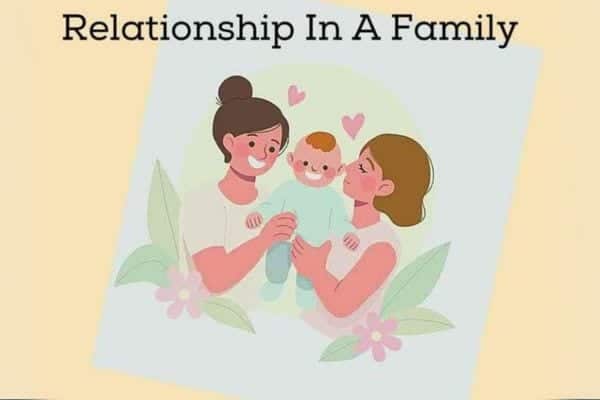
The term family in today’s context includes many different settings. It is not limited to a heterosexual couple and their children. I am listing a few other relationships that can come under the purview of family therapy.
– Couples
– Same-sex couples
– Single parents with children
– Blended families
– Same-sex parent families
– Adopted families
– Foster families
– Extended families
– Families with grandparents
– and many more.
What Is Family Therapy Or Systemic Therapy?
Family therapy is about awareness amongst family members about their patterns of connectedness and communication styles.
The focus of systemic therapy is to determine interpersonal relationships among each other and strengthen the communication within the members.
The family therapist will focus on the verbal as well as non-verbal communications happening within the family. It is next to impossible not to communicate within a family.
Family therapy is about understanding these communication exchanges—it about recognising patterns, both beneficial and dysfunctional.
The therapy’s role is to introduce new information into the system through.
– discussions in the therapeutic setting
– allowing all members to have a voice and
– listen to each member’s concerns.
This new information might centre around the beliefs, feelings or behaviours of the family system.
Many members feel heard in their family for the first time.
The old established patterns of relationships slowly start shifting to new functional relationships with all the latest information pouring in during family sessions.
How Is Family Therapy Different From Individual Therapy?
Individual counselling generally focuses on a person as if the problems and solutions for the counselling issues lie within them. It is intrapersonal.
Family therapy, on the other hand, believes in making changes in entire life systems. It is interpersonal, intrapersonal, and systems focused therapy. Family therapy focuses on the family’s relational and communication aspects, even though only one person may display their counselling issues.
Family therapy is also called systemic therapy since it works with family systems as a whole.
What Is The Rationale For Family Therapy?
Family therapy strongly believes that most life difficulties that arise in an individual’s life can be effectively addressed within families.
Families are powerful forces that work either for the good or the detriment of their members.
It believes that the action of one family member impacts the actions of others in this system.
Usually, when a parent approaches me to see a child or a teenager for therapy, I ask for the whole family’s involvement in treatment. A child or teenager is never the ‘problem’. Problems arise within the family, culture, beliefs, parenting style, and many more factors. A child’s or teenager’s self-esteem boosts when they realise that they are not the ‘problem’; however, family is the issue.
Problem-solving accelerates even for partners in therapy. The same principle as above applies. In family therapy involving couples, it’s not one person who is at fault. Hence the therapist will look at the systemic dynamics to suggest changes.
Who Can Benefit From Family Therapy?
- Families with Marital problems
- Ongoing Parent-child conflicts
- Sibling rivalry and problems
- Coping with illness in the family
- Adjustment problems among family members
- Issues in the family due to inconsistent parenting or attachment styles
- Inability to handle emotions in a family.
How Is Family Therapy Beneficial?
Family therapy helps in many ways.
– Each member has a voice and feels heard
– Each member gets the space to voice their perspectives
– Each member gets an opportunity to listen to other members’ perspectives.
– They can see the ‘stuckness.’
– Each family member can contract to make a change.
– The change is not expected from one member only.
– Transitioning through stress, anxiety, life events is relatively smoother.
– Improves communication within members
– Therapy provides insights and new information about the system
A meta-analysis of more than 250 studies conducted by the Journal of Marital and Family Therapy by American Association for Marriage and Family Therapy, 1995, states many benefits of family therapy, including
– Positive effects on treating disorders such as
– adult alcoholism
– adult and adolescent drug abuse
– affective (mood) disorders
– adolescent conduct disorder
– and many more
What Are The Factors That Affect A Family’s Well-being?

The factors include:
– Lack of communication
– Lack of understanding
– Unaware of the child mental health
– Lack of empathy
– Negligence towards the family members
– Underestimating the importance of children upbringing and spouse relationships
– Lack of awareness of how to deal with children in difficult situations
– Separation from family members
Daily family conflicts can result in a mental and physical breakdown.
What Are Some Of The Major Setbacks That May Create A Family Breakdown?
The setbacks include:
– Financial problems
– Communication breakdown
– Mental or physical disability
– A serious illness
– Drug addiction
– Marital issues
– Overwhelming responsibilities
– Physical, Verbal, Emotional and Sexual Abuse
– A sudden transition in life
What happens when people don’t have enough ability to survive through such setbacks and become frail?
What happens when there is not even a single person with whom you can share things?
According to the World Bank Group, around twenty percent of children and adolescents have mental disorders such as anxiety, depression, substance abuse and more.
Most of these mental health conditions and disorders arise from a child’s frame of reference to the situations they face in their daily family life.
For example, a child witnessing depressed parents may also have symptoms of depression. Another child seeing a depressed parent may grow up resilient as they have other supportive family members. Many factors will impact the mental state of children. A significant factor is attachments to their parents.
Another critical factor to be considered will be emotional neglect. Do read our article on emotional neglect.
Why Do Families Need Therapy?
Family therapy helps families to cope, adjust and grow within the healing context.
– Therapy helps to cope with and overcome mental and physical breakdowns.
– It assists in considering each family member’s well-being and viewpoint.
– It helps a lot in reducing the stress and conflicts concerning the individuality of each family member.
– Family therapy intervention can go to a greater length to save the family’s troubled relationship with partners, children, or extended family members. Be it a communication breakdown, unusual arguments in-home, disturbed relations with children and spouse, exhausting routine, suicidal thoughts of any family member, and many other reasons.
– Also, family therapy can help sort out, if not then, mitigate such issues to a very minimal level and make things acceptable.
– Family therapy is a type of psychotherapy that strengthens emotional resonance among the family.
– It develops feelings and understanding of one’s situation from a different perspective. It allows you to be humbler and caring towards your family members and their issues.
– The family as one unit creates synergy and tends to be happier and prosperous.
What Happens At Family Therapy?
Generally, family therapy consists of multiple sessions and group discussion with several family members sometimes one on one or in a couple. The therapist seeks to identify the root cause by listening attentively to all family members’ patterns of living, communication, and relationship among the family members. There are a couple of pointers on which therapists rely their expertise upon:
– Understanding family’s problems and their intention towards each other in terms of thoughts and emotions.
– Identify family status, roles, and patterns in which they interact with each other to work out on issues.
– Examine the family strength, such as stepping ahead for each other, and weaknesses, such as not giving enough attention to one’s internal feelings and emotions.
Example: Stress, Relationship Anxiety
In many households, little importance is given to the emotional well-being of a child. In most cases, parents assume financials as the ultimate responsibility on their children regardless of what their children go through during challenging times of failure, relationship breakdown, and career challenges.
Generally, children grow up coping with emotional challenges in their own way.
Their challenging situations can lead to dysfunctional coping mechanisms. They may lead a life full of stress and anxiety or fall into depression or other mental health issues like social anxiety. .
Such situations lead to a lack of communication amongst family members, indecisiveness, avoidance of each other in family groups. In such a situation, family therapy can help to:
– Make parents realise that their children can be the victim of mental disorders
– Make children realise their strengths and prevent them from being frail down.
– Enhance coordination among family members and work on problems to resolve them
When Is It An Excellent Time To See A Therapist?
As we have discussed, we need to identify the problem first to solve it. As a therapist, I usually do not see families approaching me at the start of the problem. They start looking for solutions when the issues are chronic. I always say, “Better late than never”.
We need to look out for symptoms that have caused distress in our lives.
– Is it a pattern that does not have a solution?
– Have you tried and failed at different solutions?
– Are you tired of sorting out issues or coping with them all the time?
– Are the issues a cause of stress and anxiety at home?
– Have the issues severely impacted your daily life?
– Are the issues impacting your school life or work life?
– Are you feeling overwhelmed?
– Do you notice a rise in unusual anger or rage?
– Are you irritated easily by things around you?
– Are you or any of your family member having continuous negative thoughts that are distressing?
-Is any of your family member losing hope or motivation in the future? Feeling helpless, desperate or having extreme thoughts?
Many of the above issues may be individual, but you may want to reflect on bringing the family together to help sort the problems.
What If One Family Member Is Not Agreeable To Family Therapy?
Many times a family member may be in denial that they are the problem. In my therapeutic context, I notice many times parents are in denial. They do not want to acknowledge that the roots of the issues can be systemic.
Similarly, when I see couples, many times, one partner has reluctantly followed the other to therapy. They strongly believe the problem is not themselves but their partner.
A therapist cannot force any member to come for therapy sessions. This responsibility lies with the family. You may take a session or two to understand how you can gain their trust to attend treatment.
I have noticed that when parents are willing to own up and say that they may also be a problem and to sort out issues together, a child or teenager is more inclined to come for therapy. As parents or caregivers, you may need to give their problems a listening ear. I usually guide my clients on communicating with their children to build an emotional bond with them.
How Can We Tell If The Therapist Is Not Working?
There are times when you pick out a therapist who is not a good fit for us. But how do we identify that the therapy is not working for us? Well, we have got few signs that depict that treatment may not be working for you.
1. If any family member does not believe their voice is important or heard during the sessions, despite raising this issue in the sessions.
2. If any member believes that the therapist is judging them. The member needs to raise this issue in therapy and seek a response from the therapist. If the members are not satisfied and demotivated, it may be a clue to change the therapist.
3. Sometimes, a therapist may align with one member of the family. If the issues are brought to the therapist’s notice, and nothing is done about it, you may want to consider changing your therapist.
4. The basic fundamental of the client-therapist relationship is the innate trust we have in them. If a member doubts their therapist or feels uncomfortable sharing their personal history even after a few sessions, then consider changing the therapist.
However, before you decide to make a change, look inwards. Is this a pattern with you or your family member that needs to be addressed? Maybe then it’s an excellent place to open the issue for therapy.
What Kind Of Results Should One Expect To See?
The focus of family therapy is to give new insights into the patterns of communication and relationship connectedness. That’s where therapy will help. It will help you recognise dysfunctional beliefs, communication issues and listen to each other’s viewpoints.
As a transactional analyst, I usually get mutually acceptable contracts from each family member to make changes. For example, when I meet teenagers and their parents, one issue is studying versus TV.
In the session, a teenager can listen to their parents’ viewpoint and vice versa. A parent listening to their teenagers’ viewpoints without discounting them is a rarity. This rarity helps build different insights and new contracts. For example, Tony will study for three hours, and parents will not nag about TV time if it does not exceed two hours.
Final Thoughts:
Each family has their difficulties and enjoyments. However, if the problems are mounting and giving stress, anxiety, and other mental health issues, consider family therapy. In Asia, we do have a stigma attached to therapy. However, my question to everyone reading this article – Is the social environment important or our family life? Do read our blog on the destigmatisation of therapy.

